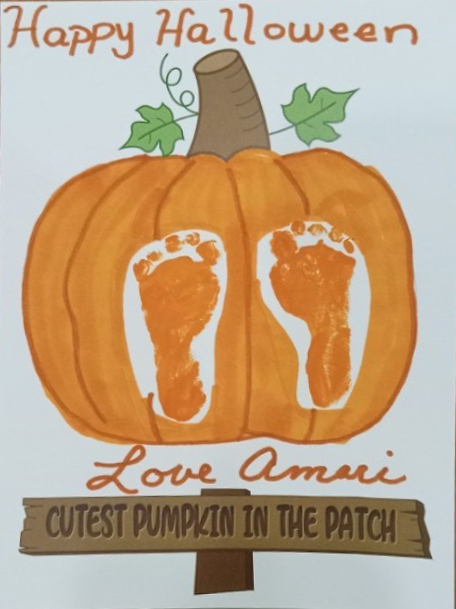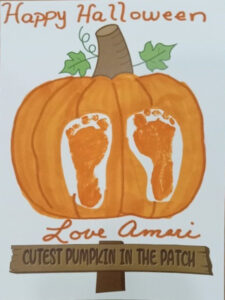
by Erin Faulkner, Family Peer Supporter
November 14, 2023
“My name is Anna, and I’m the mom of a beautiful little girl named Amari Ray. She’s a miracle baby because she was born at only 29 weeks. I first found out that she was high risk within the first trimester. Then at one of her last ultrasounds, I found out her umbilical cord stopped giving her blood. The next day I was admitted to labor and delivery. The following morning, she was born healthy and beautiful. She has been thriving and is almost ready to come home. She is also a miracle because she has helped me find a serenity that I have been searching for – a serenity that I tried to replace with alcohol. I’m a recovering alcoholic, and I now realized that the buzz I felt from alcohol is nothing compared to he unbridled joy and love I feel when I look at my daughter.”
 This story is very close to my heart. Anna is my sister. I have seen her struggle since her teenage years. At the heart of her struggles, and only discovered in recent years, is her diagnosis of several mental health challenges. She was also adopted from South Africa as a toddler and has struggled with feelings of abandonment and attachment her whole life. Anna has fought family and friends in search of what would make her feel better, feel more. It has challenged our family as she has lost battles in the past.
This story is very close to my heart. Anna is my sister. I have seen her struggle since her teenage years. At the heart of her struggles, and only discovered in recent years, is her diagnosis of several mental health challenges. She was also adopted from South Africa as a toddler and has struggled with feelings of abandonment and attachment her whole life. Anna has fought family and friends in search of what would make her feel better, feel more. It has challenged our family as she has lost battles in the past.
The change in Anna since Amari’s arrival has been evident in all who have visited her. Helena doesn’t have a NICU, so Anna has been living at Benefis in Great Falls for the past 5 weeks. She is away from old friends and temptations, a forced “detox” from people that held her down, held her back, pulled her in. Living in the Great Falls area myself, I have been able to visit when I can, though a lengthy head cold kept me away for a few weeks.
This change in Anna has been evident by all who have visited her. As she said in her story, she seems to have found serenity. She is calm, coherent and engaging. Anna is so knowledgeable about her baby. She cares for her as often as she is allowed and reports to family every gained ounce and every new milestone, just as a doting mama should. Amari has won all of our hearts. She comes from a family of tough women!
Amari was born at just 2 lbs. exactly and 13.25 inches. The NICU at Benefis is amazing with private rooms and wonderful, caring nurses. They have supported Anna, so that she has been able to learn how to care for her baby and do as much of her daily care as possible. Anna has texted her sisters and our mother almost daily with updates on her weight and milestones. Here is a timeline of Amari’s fight for life.
- 9 days old - 2 lbs. 3 oz. skin to skin cuddles
- 12 days old - 5 oz., can wear clothes and be swaddled, the cloth cover is off the incubator
- 14 days old - Using a pacifier
- 25 days old - 2 lbs. 12 oz. NICU takes Halloween photos and Halloween crafts
- 26 days old - 2 lbs. 13 oz. 5 in. long
- 1 month old - Drank from a bottle – 6 ml.
- 32 days old - 3lbs!!!
- 35 days old - 3 lbs. 3 oz. No longer on oxygen
- 36 days old - 3 lbs. 6 oz., drinking 30 ml at a time, top is off the incubator, off caffeine
 Today Amari is 38 days old. She is technically still 34 weeks (gestation). She was not supposed to be born for another 6 weeks and now she is projected to be in a normal crib in 2 days and go home in a week. We are all so happy and blessed by how well this little miracle is doing! I am so thankful that my sister and niece have such a support system that will help take care of them both in their journeys ahead.
Today Amari is 38 days old. She is technically still 34 weeks (gestation). She was not supposed to be born for another 6 weeks and now she is projected to be in a normal crib in 2 days and go home in a week. We are all so happy and blessed by how well this little miracle is doing! I am so thankful that my sister and niece have such a support system that will help take care of them both in their journeys ahead.
November is Prematurity Awareness Month and November 17th is World Prematurity Day. Show your support by wearing Purple or sharing your support on social media.
Preterm birth (babies born before 37 weeks) is currently at 10.4% of births. This number is higher for African-American women at 14.6%. Babies born before 32 weeks have higher rates of death and disability. Survival rates for babies born after 28 weeks is 80%.
Click here for more information on how to reduce your chances of having a pre-term baby.
Click here for more information on complications and statistics of pre-term babies.

